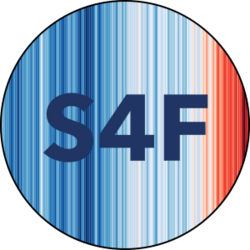Organization:Scientists for Future
From HandWiki
Short description: an environmental initiative founded by a group of scientists in 2019
Scientists for Future | |
 Logo includes warming stripes graphic | |
| Abbreviation | S4F |
|---|---|
| Type | Environmental |
| Website | scientistsforfuture scientists4future |
German scientists Volker Quaschning, Eckart von Hirschhausen, Henning Krause (de), Martin Visbeck (de) and Gregor Hagedorn (wikidata), at the 15 March 2019 climate march at Invalidenpark (de), Berlin-Mitte, in front of the Federal Ministry for Economic Affairs and Energy
Demonstrator at the July 2020 Monday Demonstration in Berlin, showing warming stripes data visualization graphics on mask and sign
Scientists for Future (S4F) is an environmental initiative founded by a group of scientists in Germany, Austria, and Switzerland in support of the student movement Fridays for Future (FFF).[1][2][3]
In March 2019 the initiative issued a statement titled Statement of scientists and scholars concerning the protests for more climate protection.[4][5][6][7][8] The statement was signed by over 26000 German-language scientists and scholars.[9][10][11]
Facts
The scientists list 24 established scientific facts on climate change, verifiable by reference to the scientific literature.[12] These include facts on:
- The mean temperature rise,[13][14][15][16] and global temperatures in 2015, 2016, 2017 and 2018.[17]
- Statement of fact that the cause of temperature rise is almost entirely caused by human factors,[18][13][14]
- Descriptions of the effects of global warming, including a rise in the probability of extreme weather conditions,[19][13][15][20] and the effects of global warming on human health.[21][22]
See also
- Scientists for Extinction Rebellion
- World Scientists' Warning to Humanity
References
- ↑ Schirmer, Sophia, ed (2019-09-10). "Scientists for Future: "Es macht mich traurig, wie dumm wir sind" - Christoph Schneider erforscht seit 25 Jahren, wie sich das Klima der Erde ändert. Lange hat niemand zugehört. Jetzt wird er selbst zum Aktivisten, ein bisschen zumindest." (in de). ZEIT Campus ONLINE. Zeit Online. https://www.zeit.de/campus/2019-09/scientists-for-future-christoph-schneider-klimaschutz-aktivismus/komplettansicht.
- ↑ "Fridays und Scientists for Future - Völlig neue Dialogerfahrung - Unter Wissenschaftlern trifft der Klimaprotest von Fridays for Future auf offene Ohren. Viele Forscher sind froh über eine so breite Unterstützung" (in de). Die Tageszeitung (taz). 2019-08-17. https://taz.de/Fridays-und-Scientists-for-Future/!5615730/.
- ↑ "Scientist for Future in der Region: Schwieriger Weg zum freiwilligen Verzicht" (in de). Zeitungsverlag Aachen GmbH. 2019-09-15. https://www.aachener-zeitung.de/nrw-region/scientists-for-future-professor-der-universitaet-luettich-beteiligt_aid-45839881.
- ↑ "Statement of scientists and scholars concerning the protests for more climate protection - The concerns of the young protesters are justified". Scientists for Future. 2019. https://www.scientists4future.org/stellungnahme/statement-text/.
- ↑ "Scientists4Future - Wissenschaftler unterstützen Schülerdemos für den Klimaschutz" (in de). Deutschlandfunk. 2019-03-12. https://www.deutschlandfunk.de/scientists4future-wissenschaftler-unterstuetzen.697.de.html?dram:article_id=443354.
- ↑ "12 000 Wissenschaftler stellen sich hinter die streikenden Schüler" (in de). 2019-03-15. https://scilogs.spektrum.de/klimalounge/12-000-wissenschaftler-stellen-sich-hinter-die-streikenden-schueler/. "Update 15.3.: wir haben noch bis gestern Abend weiter gesammelt – ein paar Tage mehr und jetzt haben schon mehr als 23 000 Forscher unterschrieben!"
- ↑ "Pressemitteilung für Deutschland der Initiative Scientists for Future" (in de). Berlin, Germany. 2019-03-12. https://www.scientists4future.org/wp-content/uploads/2019/05/S4F_PM_20190312_DE.pdf.
- ↑ dpa (2019-03-15). "Schüler in über 100 Staaten demonstrieren für mehr Klimaschutz" (in de). Frankfurter Allgemeine Zeitung (FAZ). https://www.faz.net/aktuell/politik/ausland/klimaschutz-schueler-in-ueber-100-staaten-demonstrieren-16090936.html.
- ↑ "The concerns of the young protesters are justified: A statement by Scientists for Future concerning the protests for more climate protection". GAIA – Ecological Perspectives for Science and Society (oekom verlag (de)) 28 (2): 79–87. 2019. doi:10.14512/gaia.28.2.3. https://www.oekom.de/fileadmin/zeitschriften/gaia_leseproben/GAIA_2019_02_079_087_SCIENTISTFORFUTURE.pdf. Retrieved 2019-09-22. (9 pages)
- ↑ ""Scientists for Future": Verbündete Forscher" (in de). Die Zeit 2019 (12). 2019-03-13. https://www.zeit.de/2019/12/scientists-for-future-schueler-klimawandel-proteste-petition.
- ↑ "Scientists for Future: "Die junge Generation hat Recht"" (in de). Die Tagesschau. 2019-03-14. https://www.tagesschau.de/inland/wissenschaftler-fridays-for-future-101.html.
- ↑ "Facts" (in en-EN). Scientists for Future. 2019-03-01. https://www.scientists4future.org/stellungnahme/facts-2019-03.
- ↑ 13.0 13.1 13.2 Intergovernmental Panel on Climate Change (IPCC). 2013. Climate change 2013: The physical science basis. Contribution of working group I to the fifth assessment report of the Intergovernmental Panel on Climate Change. Cambridge, UK: Cambridge University Press.
- ↑ 14.0 14.1 Climate change 2014: Synthesis report. Contribution of working groups I, II and III to the fifth assessment report of the Intergovernmental. Panel on Climate Change. Geneva: IPCC. Intergovernmental Panel on Climate Change (IPCC). 2014. http://www.ipcc.ch/site/assets/uploads/2018/02/SYR_AR5_FINAL_full.pdf. Retrieved 2019-05-16.
- ↑ 15.0 15.1 "Global warming of 1.5 °C. Special report.". Intergovernmental Panel on Climate Change (IPCC). 2018. http://www.ipcc.ch/report/sr15.
- ↑ "Annual mean land-ocean temperature index in 0.01 degrees Celsius selected zonal means.". National Aeronautics and Space Administration (NASA). 2018. https://data.giss.nasa.gov/gistemp/tabledata_v3/ZonAnn.Ts+dSST.txt.
- ↑ "2018 fourth warmest year in continued warming trend, according to NASA, NOAA.". National Aeronautics and Space Administration (NASA). 2019. https://climate.nasa.gov/news/2841/2018-fourth-warmest-year-in-continued-warming-trend-according-to-nasa-noaa.
- ↑ Climate Science Special Report: Fourth National Climate Assessment. I. Washington, DC, USA: U.S. Global Change Research Program. 2017. doi:10.7930/J0J964J6. NCA4. https://science2017.globalchange.gov/downloads/CSSR2017_FullReport.pdf. Retrieved 2020-04-02. (470 pages)
- ↑ Intergovernmental Panel on Climate Change (IPCC) (2012). Managing the risks of extreme events and disasters to advance climate change adaptation: Special report of the Intergovernmental Panel on Climate Change. Cambridge, UK: Cambridge University Press. ISBN 978-1-107-02506-6. http://www.ipcc.ch/site/assets/uploads/2018/03/SREX_Full_Report-1.pdf. Retrieved 2019-04-12.
- ↑ National Academies of Sciences, Engineering, and Medicine (Ed.). 2016. Attribution of extreme weather events in the context of climate change. Washington, D.C.: National Academies Press.
- ↑ "Health and climate change: policy responses to protect public health". The Lancet 386 (10006): 1861–1914. 2015-11-07. doi:10.1016/S0140-6736(15)60854-6. PMID 26111439. https://www.thelancet.com/journals/lancet/article/PIIS0140-6736(15)60854-6/abstract. Retrieved 2019-10-13.
- ↑ "The 2018 report of the Lancet Countdown on health and climate change: Shaping the health of nations for centuries to come". The Lancet 392 (10163): 2479–2514. 2018-12-08. doi:10.1016/S0140-6736(18)32594-7. PMID 30503045. https://www.thelancet.com/journals/lancet/article/PIIS0140-6736(18)32594-7/abstract. Retrieved 2019-10-13.
Further reading
- "Excerpt from a statement signed by more than 700 initial signatories and by 2019-03-14 by more than 18000 German, Austrian and Swiss scientists". https://www.scientists4future.org/wp-content/uploads/2019/05/S4F-Postkarte-digital-140319-EN.pdf.



